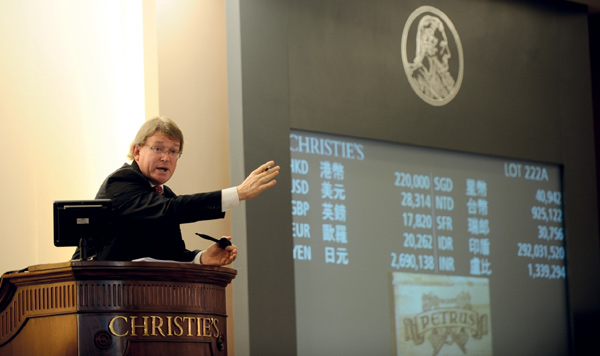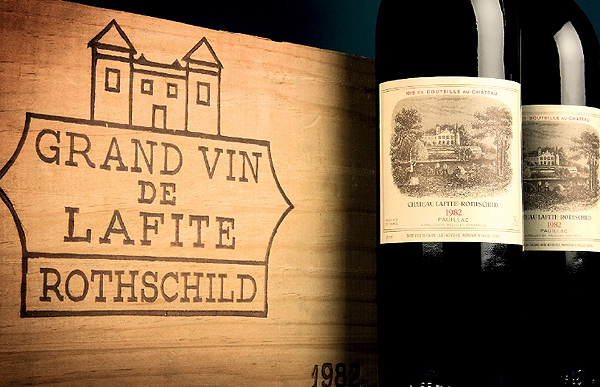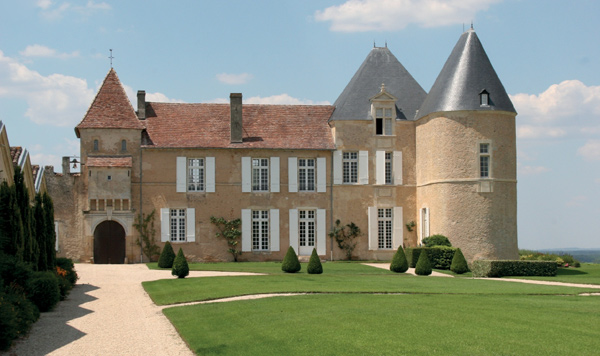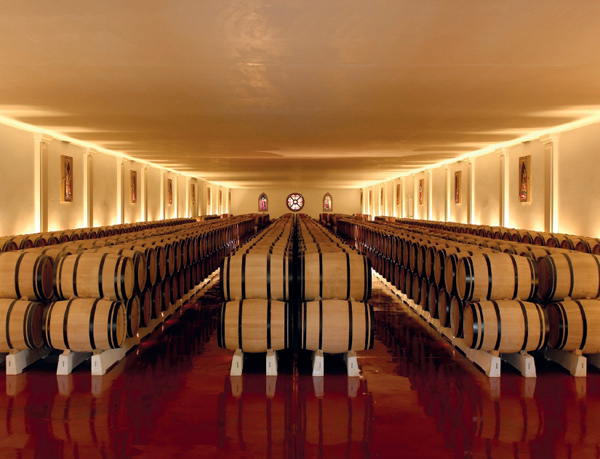BANKING ON LIQUID ASSETSWine investment is a safe alternative bet. While the world faces the worst financial crisis in history, wine investment has been moving in its own direction, as investors turn to tangible assets with intrinsic value. Even as late as September 2008, record prices were still being achieved at auction and sentiment was riding high that fine and rare wine would resist the slump of other luxury goods. Still, though the recession has been slow in affecting the wine industry, nothing is immune from the market's freefall. And as prices of some of the best Bordeaux vintages have dipped in recent months, 2009 is turning out to be a year for buyers.
In Q4 of 2008, the bears arrived at wine auctions with low percent-sold rates and sale prices, as many regular buyers waited it out or became more selective, with a rare bright spell in the form of Christie's Hong Kong sale where lots went for above their estimates and Chateau Latour wines fetched records. Herve Aymond, Cofounder and Director of fine wine merchant Corndale Consultants, states, "It was an exceptional sale during exceptional times. Is it going to act as a benchmark? No. Does it mean that rare wines keep their value? Yes." Overall, global wine auctions declined by US$ 25 million in 2008, an eight per cent drop from 2007.
Auction houses have therefore lowered their estimates and reserves, sometimes by 30 per cent or more, to adjust to the new market reality as collectors choose to buy wine at more attractive prices. Jamie Ritchie, Senior Vice President and Head of Sotheby's Wine Department, North America, explains, "The wines we offer are of superb quality but very reasonably priced – a perfect opportunity for collectors to build up their collections, and for new collectors to enter the market."

Q1 of 2009 saw a stabilisation of prices at what was perceived to be fair value and an increase in auction attendance and percent-sold rates, though less wine had been sold and prices continued to decline. Ritchie says, "We believe that wine prices will settle down to levels that reflect quality and rarity, without the inflation that we saw in the previous two years."
With a low correlation to stocks and bonds, Bordeaux wines' established resale history has outperformed equities, real estate and many commodities. Top investment-grade wines have historically brought in average returns of over 10 per cent annually. David Elswood, International Head of Christie's Wine Department, reveals, "Wine has risen in value quickly, especially over the past three years. With established collectors from Europe and America being joined by new buyers from emerging markets, demand for the best wines has increased dramatically."

As long as investors ride out the financial crisis, they are likely to see good gains as investment-grade wines have long ageing potential and a liquid secondary market. Aymond reveals, "Mouton '82 or Latour '82, which is S$ 4,500, will go to S$ 10,000. The minute that we emerge from this crisis, it will climb so fast that you won't be able to stop it." Eldric Ko, CEO of wine investment company Premium Liquid Assets (Singapore), says, "Especially so during this credit crunch, people want to see physical assets. And that's the best thing about wine – why the stock market can crash, why prices have dropped, but it doesn't crash. People realise, 'I'm holding on to my money right now rather than passing it on to the banks."
Therefore, alternative investments are particularly attractive in times like these, especially now that it's a collector's market. Ko remarks, "Now is a good time for bargain hunting. If one year back, you wanted to buy Lafite '82, it would have cost you a bomb; now, you're getting a steal."
Fine wines have performed well in times of crash as they are based on supply and demand. There are finite quantities of investment-grade wine produced each year, and fast-rising demand leads to price increases as supplies diminish. Collectors, especially those in Asia, still have an appetite for wine, bolstered by Hong Kong's elimination of wine import tax and duty last year and increased interest in wine, even if there is price weakness in the short term.

On the strength of their growing affluence and purchasing power, the fastest-growing Asian wine markets of Hong Kong and China, and Russia and Brazil are buying fine wine to diversify their investment portfolios to offset the fluctuations of traditional assets, though the momentum has slowed somewhat. Elswood divulges, "Asia is the most important vibrant new market for fine wine and will continue to grow as wine drinkers learn more about the quality and rarity of the best bottles."
Serious wine investors often participate in the annual en primeur (wine futures) campaign, where fine Bordeaux wines are sold while still in barrel. Buyers pay up in cash one or two years before receiving their wine, basing purchases on the winemakers' track records. They pay taxes and duty only upon delivery of the wine or have them stored in bonded warehouses to be sold on. The advantage is that they are able to secure great vintages at release prices (usually the lowest possible), before demand and prices rise upon bottling. Additionally, ex-chateaux wines carry premium resale value due to guaranteed provenance and condition. The late-harvest 2008 Bordeaux en primeur wines were a surprisingly good vintage and will likely be profitable, with release prices at least 30 per cent down on 2007. Aymond says, "If you buy en primeur every year, you'll have a cellar that will grow in value."
It's common knowledge that buying is the easy part and selling isn't always straightforward, factoring in costs like storage, insurance, shipping and auction and merchant fees. Still, it's not just about making money but future pleasure, as regular investors enjoy pulling the cork on a fine bottle, perhaps buying five cases of a wine and keeping three for investment and two for drinking. In this way, they'll be drinking wines that pay for themselves. In uncertain times, wines just may be the safe haven that investors seek.

Investment Tips
- Research the wine market. The Internet (i.e. www.winesearcher.com), Liv-ex and magazines like Wine Spectator, The Wine Advocate and Decanter are good resources.
- Check the rarity, provenance, condition and source of creation of the wines before purchase, and buy the highest quality you can afford, preferably the best vintages of reputable blue-chip wines with Robert Parker ratings of 95 points and above.
- Deal only with trusted and established companies, and aim to source directly from chateaux cellars through negociants (Bordeaux middlemen).
- Be patient and understand the exit strategies available so you can cash out at the right moment and not after sudden price increases. by Y-Jean Mun-Delsalle
|
 +65 6696 7068
+65 6696 7068
 info@meridian103.com
info@meridian103.com
 PDA
PDA
 +65 6696 7068
+65 6696 7068
 info@meridian103.com
info@meridian103.com
 PDA
PDA
